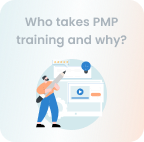







 10 Sep 2024
10 Sep 2024

 12 Sep 2024
12 Sep 2024



Are you considering taking the PMP Exam but wondering, “How Hard is the PMP Exam?” If you’re feeling a mix of excitement and apprehension, you’re not alone. The PMP Certification is a coveted credential for Project Managers worldwide, but it’s known for its rigorous standards and challenging content.
But here’s the good news: while the PMP Exam is tough, it’s not insurmountable. With the right preparation, focus, and a little bit of resilience, you can turn this challenge into a triumph. This blog on “How Hard is the PMP Exam” will walk you through everything you need to know—from the exam’s format and key difficulties to insider tips for acing it.
Table of Contents
1) What is the PMP Exam?
2) How Hard is The PMP Exam?
3) What Makes the PMP Exam Difficult?
4) Is Earning a PMP Certification Challenging?
5) PMP Exam Format
6) Tips to Pass the PMP Exam
7) Conclusion
The PMP Exam, administered through the Project Management Institute (PMI), is a global measure of your experience and ability to deal with projects to lead them. It attests to the fact that you understand and can competently apply Project Management techniques, tools, and methodologies.
This globally recognized credential is considered the gold standard in Project Management and requires a combination of education, Project Management-related work experience, and formal training in Project Management.
The PMP Exam is difficult and has a reputation for being one of the most challenging professional certification exams. The regulating agency never discloses it officially, but survey data usually has a pass rate of 50-60%, generally to depict the difficult nature of the test.
This is the exam to test not only your theoretical knowledge but also your practical approach toward application of Project Management principles in real-life work. This needs one to be well-versed with the PMBOK guide and have a good understanding of concepts like Agile methodologies, project risk management, and stakeholder communication.
Here are the factors that will give an idea about how the PMP Certification exam is hard to pass:

1) Detailed Content: The PMP Exam covers everything from five process groups, namely, Initiating, Planning, Execution, Monitoring and Controlling, to ten knowledge areas - Closure. You must have a full understanding of traditional Project Management as well as Agile Project Management.
2) Difficult Questions: There are 180 questions in this exam, each requiring analysis or decision using the scenario-based items. The questions will check your ability to apply the best practices of Project Management in complex situations, not by simply mugging up the knowledge.
3) Time Crunch: The exam is for 230 minutes (about 4 hours), which makes it about 1.2 minutes per question. In this period, there is pressure to read, analyze, and answer high-level questions.
4) Adaptive Testing: There are questions with more weight than others. This will increase the score a lot. The test’s adaptive nature means that incorrect guessing or skipping of questions may be much costlier.
The PMP Certification is difficult to obtain, but quite achievable under appropriate preparation and the right mindset. The PMP Exam is designed to test how well you could apply knowledge in real life and therefore makes it a valuable and respected professional certification in the industry. Success requires commitment, hard work, and sometimes the use of PMP prep courses or study groups.
The exam now has 180 multiple-choice questions; previously, it had 200. Some question types are single answer, multiple response, matching, hotspot, and limited fill-in-the-blank items. It has three test sections, and two breaks of up to ten minutes each are permitted.
The exam is based on three domains, which are: People (42%), Process (50%), and Business Environment (8%). This format would gauge comprehensive knowledge of Project Management skills and ability.
Here are some effective strategies to help you prepare and succeed in passing the PMP Exam:

1) Study the PMBOK Guide and Agile Practice Guide: These are the key materials that one should understand in terms of key concepts, terms, and processes.
2) Mock Exams are Your Power: Regular practicing through mock exams makes you familiar with the format of questions and helps you get a clue as to your weak areas.
3) Time Management: Making good strategies for time management during the exam is very important. This will help in building up speed and accuracy through practice.
4) Study Groups: Working with others exposes you to new ideas and ways of understanding concepts that may be hard to grasp on your own.
5) Join a Prep Course: An organized PMP prep course provides structure for your studying, study materials, practice questions, and expert advice.
6) What to Bring to PMP Exam: It is essential to know what items are allowed and required for the exam, such as identification, an approved calculator, and other necessary materials. Being prepared can help you avoid last-minute stress.
Earning a PMP Certification is a significant milestone on the path to unlocking exciting career opportunities in the dynamic world of Project Management. The PMP Exam is a rigorous challenge, demanding both academic knowledge and practical skills. However, by following this blog on “How Hard is the PMP Exam”, with your determination, strategic preparation, and focused study, success is within reach.






© Copyright 2025. All rights reserved. Contact: PMP® TRAINING ACADEMY.


